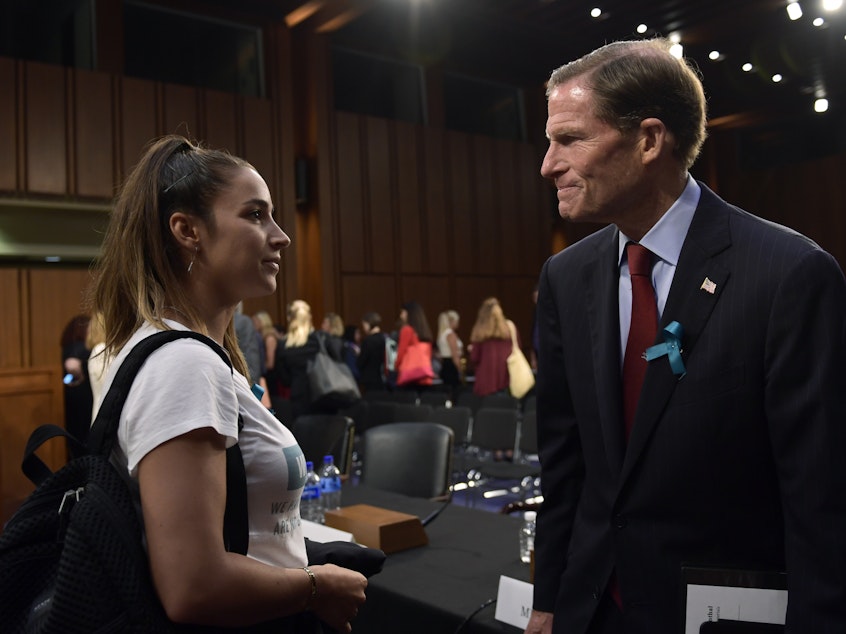In Wake of Abuse Scandals, Bill Would Hold U.S. Olympic Organizations Accountable

Over the past 18 months, Senators Richard Blumenthal (D-Conn.) and Jerry Moran (R-Kan.) have investigated how a child molester like Larry Nassar was able to serve as team doctor to the USA Gymnastics team for nearly two decades.
Nassar was sentenced to 40 to 175 years in prison in January, 2018. The senators have since convened four hearings and interviewed dozens of survivors, advocates, and officials within the Olympic movement. On Tuesday, they introduced legislation — The Empowering Olympic and Amateur Athletes Sports Act of 2019 — to fix the wrongs they see in the U.S. Olympic system.
The bill would not impose penalties like dissolving the board of the U.S. Olympic and Paralympic Committee (USOPC) or disbanding the organizations that presided over the sports with the worst records for keeping athletes safe, such as USA Gymnastics. Instead, the senators have proposed ratcheting up oversight, increasing athlete representation within the Olympic movement, and providing more resources to the organization charged with investigating sexual abuse within Olympic sports. The net effect seems to be intermediate steps, rather than wholesale change, to improve the experience of athletes vying to compete in the Games.
The legislation would boost the number of athletes involved in the administration of Olympic sports. Right now, athletes comprise 20 percent of the boards of the USOPC and the national governing bodies. That number would rise to 33 percent. In the past, athlete representatives were required to have competed within the past decade. The legislation would lift that criterion. Advocates for stronger protections for athletes within the Olympic movement, like Nancy Hogshead-Makar, a gold medalist in swimming and head of the organization Champion Women, have pushed for this change because they believe it will lead to older, more experienced individuals serving as athlete representatives, which in turn could foster change within sports organizations.
In 2017, the US Olympic Committee created the U.S. Center for SafeSport, an independent organization charged with investigating sexual abuse in the Olympic Movement. A perennial issue the Center has faced is a lack of resources and the perception that it is not truly independent from the USOPC. Blumenthal and Moran's bill would force the USOPC and the sports governing bodies to fork over $20 million a year to the Center. It would also prohibit anyone who has worked at the USOPC within the past two years from taking a job at SafeSport. This was in response to the original staffing at the Center: one of its most senior officials transferred over directly from the USOPC. She has since left the organization.
The legislation would also force everyone involved in the Olympic Movement—including at the USOPC, the national governing bodies, and SafeSport — to forward any report of child abuse to law enforcement. And the legislation establishes that USOPC would be held legally liable if it doesn't ensure that coaches and trainers who have been found guilty of abuse are banned from working within the Olympic movement. This could get at the core of a strategy the USOPC's attorneys have used in court. When survivors of Larry Nassar, for example, sued the USOPC for failing to protect them, the organization argued that it wasn't liable because governing bodies like USA Gymnastics operated independently. If this legislation passes, it won't be able to make that case going forward. Finally, the bill would require the USOPC to report to Congress every year, versus every four years, as is currently the case. And it reserves the right to dissolve the organization's board of directors and decertify sports governing bodies. The message appears to be: either improve or we will take over.
The head of the USOPC, Sarah Hirshland, offered praise for the legislation in a prepared statement. "Improving athlete safety and voice in our country's Olympic and Paralympic community, and increasing accountability for the organizations that make up that community, are central to the initiatives and reform that we began in February, 2018 – these are ongoing today," she said. "This legislation is consistent with that approach and we applaud Congress for their continued work on this critically important issue."
Han Xiao, chair of the United States Olympic Committee Athletes' Advisory Council, was more circumspect. "This does not contain the comprehensive reforms we were hoping for," he said. Hogshead-Makar was more critical. "There is nothing in here that would prevent another Nassar or [Scott] Blackmun [the former head of the Olympic Committee who was forced to resign under pressure after the Nassar scandal broke]," she said.
The legislation will have to be passed out of the U.S. Senate Committee on Commerce, Science and Transportation (on which Senators Moran and Blumenthal serve) and be approved by both the House and Senate if it is to become law. Senator Moran said in a conference call he is confident that it would be passed "basically intact."
Olympic Gold Medalist Jordyn Wieber said, "On behalf of all members of Team USA, I thank Senators Moran and Blumenthal and the members of their subcommittee for listening to the voices of survivors and taking bold action to hold the US Olympic Committee accountable for their failure to protect athletes from physical, emotional and sexual abuse.
"Stronger oversight by Congress and a truly independent Center for SafeSport is necessary to restore public confidence in our Olympic organizations and protect the health and safety of athletes who strive to represent the highest values of our Nation," she said. [Copyright 2019 NPR]



